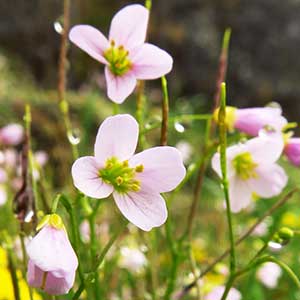Cardamine nuttallii
Cardamine pattersonii
beautiful bitter-cress, beautiful bittercres, Nuttall's bittercress, Nuttall's toothwort, palmate toothwort, slender toothwort
Saddle Mountain bitter-cress
(tuberiform, fragile), with ovoid to oblong or cylindrical nodal swellings, slender, 2–5 mm diam., (fleshy).
cylindrical, slender, 0.5–1.5 mm diam.
erect, unbranched, 0.5–2(–3) dm, glabrous or sparsely pubescent distally.
(simple from base), erect, (not flexuous), unbranched or branched basally, 0.6–3 dm.
rosulate or not, 3 or 5-foliolate, 1–6 cm, leaflets petiolulate;
petiole 0.4–2.5 cm;
lateral leaflets similar to terminal, considerably smaller;
terminal leaflet (petiolule 0.1–0.4 cm), blade obovate to orbicular or subcordate, 0.3–1.5(–2.0) cm × 2.5–16(–18) mm, base obtuse to rounded or cordate, margins entire or dentate to slightly sinuately lobed.
simple or 3 (or 5)-foliolate, (3–)4–20(–25) cm, leaflets petiolulate or subsessile;
petiole (2–)3–18(–21) cm;
lateral leaflets (when present) petiolulate to subsessile, blade similar to terminal, sometimes smaller;
terminal leaflet (subsessile or petiolule 0.2–3 cm), blade (simple leaf or terminal leaflet) reniform to suborbicular or ovate to oblong, (0.9–)1.3–4(–5.2) cm × (8–)12–50(–70) mm, base cordate to obtuse, margins crenate, dentate, or 5–7-lobed, (apiculae terminating teeth or lobes, surfaces glabrous).
1–3, 3 (or 5)-foliolate, (appearing palmate), petiolate, leaflets petiolulate or sessile;
petiole (0.2–)0.5–2(–3) cm, base not auriculate;
lateral leaflets sessile, blade similar to terminal, smaller;
terminal leaflet petiolulate or sessile, blade broadly ovate to oblong or linear, (0.5–)1–3.5(–6) cm, margins usually entire or dentate, rarely lobed.
2–4, 3 or 5-foliolate, blade similar to basal, gradually reduced in size as bract, distalmost ones subtending pedicels of flowers (usually simple);
leaflet blade or bract linear to linear-oblanceolate, 0.2–0.8 cm.
ebracteate.
bracteate throughout.
sepals oblong, 3.5–5 × 1.5–2 mm, lateral pair saccate basally;
petals usually purple to pale pink, rarely white, obovate, 10–15 × 4–7.5 mm, (not clawed, apex rounded);
filaments: median pairs 5–8 mm, lateral pair 3.5–5 mm;
anthers oblong, 1.5–2 mm.
sepals oblong, (2–)3 × 0.7(–1) mm, lateral pair not saccate basally;
petals purple or pink, obovate, 6–9 × 3–4 mm, (not clawed);
filaments: median pairs 3–3.5 mm, lateral pair 2–2.5 mm;
anthers oblong, 0.7–1 mm.
ascending to divaricate, 10–35 mm.
divaricate-ascending, (10–)15–30(–45) mm.
linear, 2.5–5.6 cm × 2–2.3 mm;
ovules 8–16 per ovary;
style 4–8 mm.
linear, (torulose), 2–3 cm × 1–1.5 mm;
ovules 14–20 per ovary;
style 2–4 mm.
dark brown, oblong, 2–2.5 × 1.4–1.6 mm.
brown, oblong to ovoid, 1.7–2.2 × 1–1.5 mm, (winged distally).
Cardamine nuttallii
Cardamine pattersonii
The infraspecific taxonomy of Cardamine nuttallii has been based almost entirely on the division and margin of rhizomal leaves. The treatments by O. E. Schulz (1903), L. E. Detling (1937), and R. C. Rollins (1993), though utilizing the same characters, varied considerably, especially in the application of names to varieties. The absence of rhizomal leaves on most specimens makes varietal determination an almost impossible task. Furthermore, leaf morphology is so highly variable that it is not useful for formally recognizing some of the other variants in the species. We therefore prefer to not subdivide the species.
(Discussion copyrighted by Flora of North America; reprinted with permission.)
Of conservation concern.
Cardamine pattersonii is known from Saddle Mountain and Onion Peak in Clastop County.
(Discussion copyrighted by Flora of North America; reprinted with permission.)
- Local floras:
BC,
CA,
OR,
WA
- Local Web sites:
CalFlora,
CalPhotos,
Flora NW,
PNW Herbaria
WildflowerSearch
iNaturalist (observations)
USDA Plants Database
- LBJ Wildflower Center
- SEINet
- Plants of the World Online
- Encyclopedia of Life
- Wikipedia
- Google Image Search


